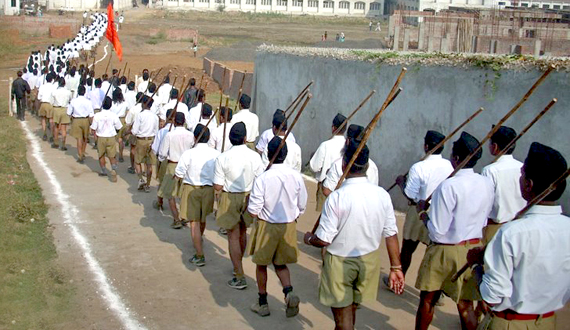
Once again the Rashtriya Swayamsewak Sangh [RSS] has urged Hindus that more children should be produced, in order to check the demographic imbalance. Did anyone call it fatwa or a diktat? How many TV channels found RSS joint secretary Dattatreya Hosbale's comments as controversial? Has there been strong criticism on editorial pages in mainstream newspapers? This is not the first time that RSS leaders have said that Hindus need to produce more kids. For them, Hindus are the 'victim'.
The bogey of 'Muslim population rise' or 'Ham Panch-Hamare Pachchis' are used by RSS to portray Muslims in bad light. Not only that the statement aims at driving wedge among religious communities, the fact is that it is truly regressive in nature.
Shouldn't RSS turn itself into a forward looking organisation?
The reason is that if RSS been a forward looking organisation, it would stop looking at things from the Hindu vs. Muslim. In that case it should have urged middle-class Indians [mostly Hindus] to stop female foeticide [and infanticide] to control the fascination for 'baby boy'.
It is this gender imbalance that is really threatening Hinduism [and India]. There are vast regions where there are less than 800 girls for 1,000 boys. Even the upper class and middle-class want the 'baby boy'. If the first child is a girl, many go for second, in the hope to have a boy.
This 'sickness' needs to be fought. Strangely, RSS leaders never tell their followers how Hinduism has been growing much faster over the last century in the world. While Islam has grown fast after 1900, overall population of Hindus in the world, has also gone up significantly, even as Christianity and other religions have now lost the pace.
As far as rise in Muslim population in India is concerned, it is not a very unusual phenomenon. The minority [Muslim] rate of growth is quite close to Dalits. Clearly, economic reasons and social backwardness are the cause behind the high birthrate.
Muslim growth rate in Kerala, Tamil Nadu much less than in UP, Bihar
In states like Tamil Nadu and Kerala, Muslims have a growth rate of much less than 20% per decade, which is less than the growth rate of Hindu population in India in many other states of North India. UP and Bihar have overall bigger families. No wonder, fertility rates are higher among Muslims in these states.
Secondly, there is no open opposition to family planning among Muslims, and they have adopted it widely. As Muslims go up on socio-economic indicators, they also tend to have smaller families, just like rest of the Indians.
As per 2001 census, the overall population grew by 21.5% in India in the previous decade. Muslim decadal population grew by a mere 13.7% in Tamil Nadu and 15.8% in Kerala [from 1991 to 2001]. These states have a higher Muslim literacy rate and here Muslims are financially better-off. In contrast, Hindu population increased by 28.7% in Punjab, 24.7% in Karnataka and 23.4% in Bihar.
How do you explain that? Now there will be critics who would say that if Muslims grew by 13.7% in Tamil Nadu in the decade, the decennial Hindu growth was just 11%.
The problem is that when the Hindu growth rate is seen, they don't take into account the growth rate of backwards and Dalits, whose population growth is comparable to Muslims.
For example, you can't expect to compare Iyers or Iyengars' decadal rise in population with Dalits or even Vanniyars. If you have to at all compare then do it with the socially upward Muslims. Else, consider Muslims also as a social group and then look at them with their growth rate.
The right comparison would be Muslim population rise vis-a-vis increase in population of social groups that have similar earning, living conditions and socio-economic backwardness. Statistics clearly reveal that Muslim population rate is falling in India and would stabilise in a few decades.
The difference of population growth rates is narrowing down fast. Far from becoming majority or even 25%, it will take centuries before they even reach the figure of 20% in India.
Perpetuating old myths: Fact is that Muslims are least polygamous in India
For decades, right-wing groups have made similar claims. Take for example, the charge of polygamy. Census clearly reveals that the practice of polygamy was highest among Adivasis, Jains, Buddhists and Hindus. Muslims came last as far as prevalence of the practice was concerned.
See this link. This is despite the fact that polygamy is legal for Muslims and unlawful for Hindus. But this is not highlighted or even mentioned. Tell a lie a thousand times and people tend to believe it. Senior RSS and BJP leaders often make attacks on Muslims about being more polygamous.
In December 2005, the then RSS chief [sarsanghchalak] KS Sudharshan had also urged the majority community in a similar manner. He said that 3-4 children per couple would keep the 'changing religious demography' in control. Just imagine had any other religious community [like a Muslim cleric from Nadwatul Ulema or Deoband] made such a statement, what would have happened?
There would have been wide condemnation, politicians and activists gunning for him and effigies burnt. TV channels would have continued debates for days. But in the case of RSS, it was simply ignored even though the 'cultural organisation' has huge impact and has a cadre strength of tens of lakhs.
If the RSS leaders take up real issues that affect the nation, they would be taken more seriously. It may also strike chord with the young generation. However, they remain stuck in regressive rhetoric.






Comments
Add new comment